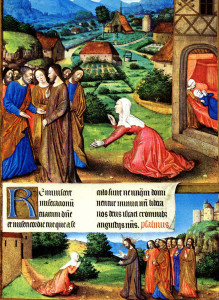
Central idea: God’s salvation is for everyone who wants it. Doctrine: Living out our salvation by doing what is just. Practical application: Being more just.
Lectionary 118.
Central Idea: God’s salvation is for everyone who wants it
Reading 1 Is 56:1, 6-7
Thus says the LORD:
Observe what is right, do what is just;
for my salvation is about to come,
my justice, about to be revealed.The foreigners who join themselves to the LORD,
ministering to him,
loving the name of the LORD,
and becoming his servants—
all who keep the sabbath free from profanation
and hold to my covenant,
them I will bring to my holy mountain
and make joyful in my house of prayer;
their burnt offerings and sacrifices
will be acceptable on my altar,
for my house shall be called
a house of prayer for all peoples.
- Communion with God—and with everyone one and everything else in God—is the ultimate good and happiness for us.
- This good was revealed to the Chosen People over time.
- Isaiah was glimpsing something on the horizon. A justice and salvation for all people was about to come. Foreigners will be acceptable and the temple “shall be called a house of prayer for all peoples.”
- How does one prepare for this? “Observe what is right, do what is just.”
Responsorial Psalm Ps 67:2-3, 5, 6, 8
R. O God, let all the nations praise you!
May God have pity on us and bless us;
may he let his face shine upon us.
So may your way be known upon earth;
among all nations, your salvation.May the nations be glad and exult
because you rule the peoples in equity;
the nations on the earth you guide.May the peoples praise you, O God;
may all the peoples praise you!
May God bless us,
and may all the ends of the earth fear him!
- Some Jews thought God’s favor was only for them. Some people today think God favors only those in their religion, whatever it is. Yet we can see just from this Psalm that God’s goodness and mercy, his authority, and his salvation are for everyone. “May your way be known upon earth; among all nations, your salvation.”
- This was to come about through the favor God showed Israel. God promised Abraham, the father of the Jews, that every nation would be blessed through him. This universal blessing was accomplished through the Jew, Jesus Christ.
Reading 2 Rom 11:13-15, 29-32
Brothers and sisters:
I am speaking to you Gentiles.
Inasmuch as I am the apostle to the Gentiles,
I glory in my ministry in order to make my race jealous
and thus save some of them.
For if their rejection is the reconciliation of the world,
what will their acceptance be but life from the dead?For the gifts and the call of God are irrevocable.
Just as you once disobeyed God
but have now received mercy because of their disobedience,
so they have now disobeyed in order that,
by virtue of the mercy shown to you,
they too may now receive mercy.
For God delivered all to disobedience,
that he might have mercy upon all.
- The Jews are the Chosen People and God has not unchosen them.
- But now anyone can become a member of the new people of God, the Church.
- God has permitted every human being to disobey him through sin. This disobedience of sin is what human beings need to be forgiven and healed of. God’s mercy to both Gentile and Jew—everyone, everywhere, in every time—is Jesus Christ. His rejection by his own people resulted in his Passion and Death, so their rejection became the source of everyone’s salvation—their forgiveness and sanctification.
Gospel Mt 15:21-28
At that time, Jesus withdrew to the region of Tyre and Sidon.
And behold, a Canaanite woman of that district came and called out,
“Have pity on me, Lord, Son of David!
My daughter is tormented by a demon.”
But Jesus did not say a word in answer to her.
Jesus’ disciples came and asked him,
“Send her away, for she keeps calling out after us.”
He said in reply,
“I was sent only to the lost sheep of the house of Israel.”
But the woman came and did Jesus homage, saying, “Lord, help me.”
He said in reply,
“It is not right to take the food of the children
and throw it to the dogs.”
She said, “Please, Lord, for even the dogs eat the scraps
that fall from the table of their masters.”
Then Jesus said to her in reply,
“O woman, great is your faith!
Let it be done for you as you wish.”
And the woman’s daughter was healed from that hour.
- Jesus was facing increasing hostility from the Jewish authorities and so he withdrew with his disciples to pagan territory on the northern coast. There he is met by a pagan woman who recognizes him as the king of Israel (she calls him “Lord,” “Son of David,” and abases herself before him). She is certain he can heal her demon-possessed daughter. That is what she wants.
- Jesus’ response is ambiguous. Mathew explicitly tells us “Jesus did not say a word in answer to her.” Why did Our Lord not answer her and why does Mathew tell us this? The disciples also wanted Jesus to “say a word”: they wanted him to tell her to go away.
- Our Lord then places an obstacle in her path: “I was sent only to the lost sheep of the house of Israel,” meaning to the Jews. But she does him homage and begs, “Lord, help me.”
- Then Our Lord throws down an even greater obstacle. “It is not right,” he says in her hearing, “to take the food of the children and throw it to the dogs.” The children are the Chosen People. The dogs are Gentiles. Jesus was sent to offer what he had to offer to his own people, God’s children, not to Gentile dogs.
- But we know Jesus did not really mean this literally. First, we know he came to save the world. Second, the reason you don’t give the dog you child’s food because then your child will go hungry. This implies Jesus only had a limited power whereas we know is power is unlimited. He could feed 5000 and heal any number of people.
- But the woman is humble and persistent when it would not be hard to imagine her getting angry and cursing Christ. She is also a desperate mother with a mother’s love for her daughter.
- Not only is the Canaanite woman persistent, her reply reveals a kind of genius: “Please, Lord, for even the dogs eat the scraps that fall from the table of their masters.”
- This woman is remarkable. Without anyone instructing her, this pagan woman recognizes who Christ is. This is while his own people, whom he came to save, are rejecting him, despite his preaching accompanied by miraculous signs.
- She knew Jesus could do good for her daughter. She learned that not only could Jesus do good, he was good.
Doctrine: Living out our salvation by doing what is just
- Speaking for God, Isaiah said, “Observe what is right, do what is just; for my salvation is about to come, my justice, about to be revealed.” John the Baptist said the same thing: “Repent, for the kingdom of heaven is at hand” (Mt 3:2). Jesus also repeated the words of the Baptist (Mt. 4:17).
- The first step on the road to salvation, and every new step on the way, is the step of doing what is just.
- Justice is giving what you owe. There are many dimensions of justice, depending on to whom something is owed and the nature of the debt.
- For example, the virtue of religion is giving God what you owe him, which includes sorrow for sins, gratitude for benefits received, requests for the goods we need, and adoration.
- Or the virtue of piety is rendering to your parents appropriate love, obedience, respect, and care, depending on the family-members’ age and circumstances.
- In every role we have in life, there are natural obligations: what we owe our siblings, our friends, our teachers, employers and employees, our neighbor, our government, our pastors and the Church, and so on.
- We prepare for God’s salvation by doing what is right. The Church teaches that we are not left on our own to do what is right only by our own power but that God’s grace draws us to what is right and helps us do it.
Practical application: Being more just
- The justice that God wants from us is very concrete and practical. This is why, for example, when tax collectors ask John the Baptist, “What are we to do?” he replies, “Collect no more than is appointed you.” To soldiers, he says, “Rob no one by violence or by false accusation, and be content with your wages.” (Lk 3:10-14) In both cases, the Baptist zeroes in on the injustices tax collectors and soldiers are naturally prone to commit.
- To make a good examination of conscience in terms of justice, one can consider his state in life (single, married, clerical, or consecrated), the roles that state entails (e.g., high school student, hospital chaplain, daughter of elderly parents, citizen), and the persons to whom justice is due, always beginning with those closest to us (God first, spouse, children, religious superior, employer, etc.). To consider the example of the Baptist’s Roman soldier, he might think, “I am a creature of God, the son of my father and mother, a sibling, a married man with children, a subject of the Emperor, a soldier in the Roman legion,” and so on.
- The next step is to stop doing what is wrong, which for a Catholic also means seeking God’s forgiveness through the Sacrament of Penance and doing due restitution. The Roman soldier cannot go to Confession, but he can stop using his military training and weapons to extort money out of people. This is what “repent” means.
- The final step is to begin doing the good as best we can with the help of God’s grace. This is a seemingly infinite obligation. For example, a husband owes love to his wife, and how can ever say, “I’ve perfectly loved her and so am done”? The husband can only keep performing acts of love, service, and sacrifice as he thinks of them and they arise through circumstances.
- I claimed above that the first step on the road to salvation, and every new step on the way, is the step of doing what is just. We are assisted on this pilgrimage by God’s grace which helps us want to take each step and to actually take the step.

Leave a Reply